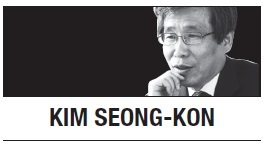[Kim Seong-kon] Fake news in a world turned upside down
By Korea HeraldPublished : Feb. 21, 2017 - 17:36
 Newspaper reports about fake news becoming rampant online in America are surprising.
Newspaper reports about fake news becoming rampant online in America are surprising.Obviously, America has changed radically since 9/11. Nowadays, many people agree that America is no longer the same idealistic country we used to know in the 1960s and 1970s, a nation that was decent and generous, honored candor and emphasized the importance of cross-cultural understanding.
However, it may not be a solely American problem. In fact, the whole world is plagued by fake news and hoaxes that spread like wildfire on social media such as Facebook and Twitter, deceiving naive and gullible people.
Some purveyors of lies upload fake news for political purposes and others for monetary gain. We seem to live in a world where deception is pervasive. Amid the fake news and bogus stories, one cannot but fear that human civilization is declining toward apocalypse.
In this polluted information environment, you do not know what to trust. In a world where fake news supersedes real news, there is only a thin line between truth and untruth.
Under the circumstances, it is only natural that we have serious trust issues and become suspicious of even easily verifiable things. In a society infested with fake news, people distrust everything and can easily be manipulated by the creators and disseminators of fake news.
Perhaps that is why we need Snopes, America’s foremost fact-checking website based in San Diego.
American magazine The Atlantic Monthly calls Snopes, “the English-speaking internet’s most important rumor-debunking site.”
Every day, thousands of people search Snopes for confirmation of a particular piece of news. In that sense, Snopes serves as a watchtower that protects us from all sorts of fake news incessantly pouring in from every direction.
In an interview that appeared in The New York Times, Brooke Binkowski, Snopes’s managing editor, said, “People don’t know what to believe anymore. Everything is really strange right now.”
Indeed, it would be dreadful if we lived in a distrustful society where we could trust nobody. The problem is that fake news circulates rapidly via social media and instigates people.
According to Binkowski, fake news was posted initially by right-wing people who hated Hillary Clinton before the election. Therefore, Binkowski thought it would go away after the inauguration of the new US president.
Since the inauguration, however, fake news has been coming from left-wing liberals, with headlines such as “Trump about to be impeached and arrested.”
In an interview with The Atlantic, Binkowski said, “It’s more wish-fulfillment stuff.”
The problem is that when such fake news spread, people naively believe the wish-fulfillment to be true.
The name Snopes is derived from the Snopes family in a trilogy of novels by William Faulkner.
The family lives in a fictional county in Mississippi. In his books, Faulkner lamented the degradation of the once proud and glorious Compson family who were helplessly pushed aside by the venal Snopes family who were carpetbaggers from the North. As Faulkner predicted, today’s world is owned and dominated by the same commercial values represented by the Snopes family.
When I met Brooke Binkowski in San Diego last June, she expressed a wish to visit Korea in the near future.
If she comes to Seoul, she will find that we, too, have fake news constantly circulating on the internet. In fact, Korea could have started it first.
In Korean society, we have a long tradition of the so-called “kadera correspondence,” which means, the “rumor correspondence or “I heard it through the grapevine.”
We also have the infamous “animyeon malgo,” attitude, which means, “Who cares about the verity of the rumor?”
During a candlelight vigil protesting the free trade agreement between Korea and the US in 2009, the perpetrators circulated fake news on the internet claiming that America had tried to export American beef infected with mad cow disease to Korea.
Naively believing the hoax, hundreds of thousands of people rushed to participate in the demonstration. Of course, they did not realize at that time that they were manipulated and deceived by nefarious crooks.
When the internet was open to the public, experts worried about the possible misuse of it.
Now their fears are turning into reality. The impact of the internet is even more devastating than originally expected because anybody can now upload and circulate fake news on Facebook or Twitter. If fakes news replaces real journalism, we will end up living in a world turned upside down.
Some people lament that we now live in an “age of incompetent leaders” and others deplore that we are regressing into the past when the world was dominated by Hitler, Mussolini, Mao and Stalin. Perhaps the more serious problem at stake now is that we no longer trust journalism due to ubiquitous fake news. We should wipe out fake news from the internet once and for all.
By Kim Seong-kon
Kim Seong-kon is a professor emeritus of English at Seoul National University and president of the Literature Translation Institute of Korea. He can be reached at sukim@snu.ac.kr. -- Ed.
-
Articles by Korea Herald








![[Graphic News] More Koreans say they plan long-distance trips this year](http://res.heraldm.com/phpwas/restmb_idxmake.php?idx=644&simg=/content/image/2024/04/17/20240417050828_0.gif&u=)
![[KH Explains] Hyundai's full hybrid edge to pay off amid slow transition to pure EVs](http://res.heraldm.com/phpwas/restmb_idxmake.php?idx=644&simg=/content/image/2024/04/18/20240418050645_0.jpg&u=20240419100350)






![[From the Scene] Monks, Buddhists hail return of remains of Buddhas](http://res.heraldm.com/phpwas/restmb_idxmake.php?idx=652&simg=/content/image/2024/04/19/20240419050617_0.jpg&u=20240419175937)

![[KH Explains] Hyundai's full hybrid edge to pay off amid slow transition to pure EVs](http://res.heraldm.com/phpwas/restmb_idxmake.php?idx=652&simg=/content/image/2024/04/18/20240418050645_0.jpg&u=20240419100350)

![[Today’s K-pop] Illit drops debut single remix](http://res.heraldm.com/phpwas/restmb_idxmake.php?idx=642&simg=/content/image/2024/04/19/20240419050612_0.jpg&u=)